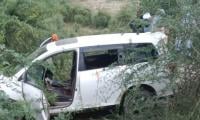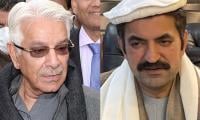LONDON: The head of the world’s chemical weapons watchdog said Friday his organisation needed a mechanism to identify the perpetrators of attacks, despite fears it could lead to accusations of politicisation.
Under its current mandate to implement the Chemical Weapons Convention (CWC), the watchdog has largely been restricted to determining whether chemical agents have been used as a weapon — and has faced criticism of bias in that more limited role.
But the high-profile use of chemical weapons in recent years in places as far afield as Kuala Lumpur, Syria and Salisbury in southwestern England requires global action, according to Uzumcu.
“I don’t think we can afford to continue to maintain this situation in the absence of an attribution mechanism to investigate, to identify the perpetrators...,” Uzumcu told an audience at the Chatham House international affairs think-tank in London.
“The international community does need to address this gap.” He added that was “the main message” that he was conveying to signatory countries of the CWC. Founded in 1997 The Hague-based OPCW aims to rid the world of toxic arms and prevent new ones being manufactured, with the Palestinians earlier this week becoming the 193rd state to join the body.
Uzumcu acknowledged any move towards attribution could open the watchdog up to charges of acting politically, but he insisted it was capable of undertaking such a role.“There is a risk of further politicisation within the organisation — that might be correct — but on the other hand all the work which will be conducted will be technical, will be science-based, while bearing in mind that the consequences may be also politically charged,” he said.
“All capabilities may not exist at the moment within the OPCW Secretariat, so we may rely on outsourcing or hiring new experts, but technically we would be capable.”Uzumcu pointed to the precedent of the “joint investigative mechanism” set up by the UN Security Council in 2015 to probe chemical attacks in Syria.
It was disbanded last year after Russia vetoed the renewal of its mandate at the UN.Uzumcu said the mechanism had proved effective, and “found responsibility of use at the level of states” as well as by the Islamic State group.
“What we face today is the most consequential fork in the road,” he added.“Wilful defiance of a valuable norm should not be allowed to go unchallenged... it is now for the (signatory) governments to fulfil their obligations.”
Veteran cricket journalist Sharda Ugra said the sport is used as a vehicle for a muscular nationalism
The UAE saw record rainfall with 254 mm falling in less than 24 hours in Al Ain, a city on the UAE-Oman border
Prime Minister Anthony Albanese singled Guerot out for praise on Tuesday
The bill passed a vote in Britain’s parliament with 383 in favour and 67 against
The Supreme Court has previously refused to accept two formal apologies from Ramdev and his firm’s co-founder...







